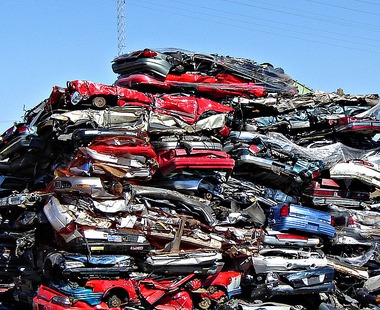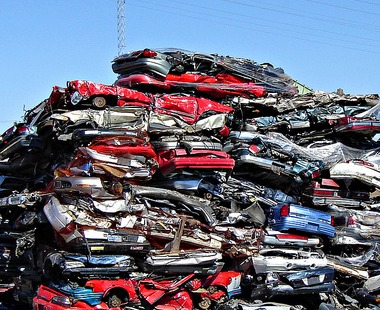 We’ve got to clean up our cars, and do away with some clunkers.Photo: Mary Anne EnriquezCross-posted from the Natural Resources Defense Council.
We’ve got to clean up our cars, and do away with some clunkers.Photo: Mary Anne EnriquezCross-posted from the Natural Resources Defense Council.
President Obama today renewed his call to move America forward by reducing our dependence on imported oil and dirty coal at a Georgetown University speech. Meanwhile at the other end of town, members of Congress are working overtime to move us backward by trying to block the EPA from doing its job of setting standards to clean up our cars and power plants.
President Obama set a new goal to reduce U.S. oil imports by one-third by 2025, primarily by accelerating the move to efficient, hybrid, and electric vehicles, and sustainable biofuels. Although he called for some measures to expand domestic production from existing leases, he recognized that we can’t drill our way to energy independence.
The president also renewed his call to get 80 percent of our electricity from clean sources by 2035. His definition of “clean” needs some work, but one thing is clear: we have to replace our aging fleet of dirty coal plants with better ways to recharge our smartphones.
These may seem like disconnected initiatives given that we hardly use any oil to generate electricity. But there is a crucial connection that will grow as we move to electrify our transportation system in order to end our dependence on oil. Plugging our advanced electric cars into old, dirty coal fired power plants does not get us where we need to go. So it absolutely makes sense for the president to advance his oil dependence reduction and clean electricity goals together.
The rubber will meet the road next week as the president and Congress try to reach agreement on a continuing resolution to keep the government open for the rest of the fiscal year. House Republicans are reportedly insisting that dirty air policy riders from their stunningly irresponsible budget billt be included. Meanwhile, in the Senate there could be votes at any time to block clean air safeguards through one or more amendments to an unrelated small business bill.
While the details differ, these various proposals to prevent the EPA from doing its job would directly interfere with achieving the goals the president laid out today. The most important tools the administration has for reducing our oil dependence are strong vehicle fuel efficiency and pollution standards. The president is rightly proud of the historic standards established jointly by EPA, the Department of Transportation, and the California Air Resources Board covering vehicles produced between now and 2016, and as the White House noted today, the next generation of standards covering 2017-2025 are currently under development. The president must not allow Congress to block any part of the collaboration among those three agencies, which is key to the effectiveness of these standards.
Similarly, the goal of producing 80 percent of our electricity from clean sources can’t be achieved if dirty power plants are allowed to continue indefinitely to emit unlimited amounts of carbon dioxide into the air. There just won’t be much of a market for clean energy sources of the future if the dirty energy sources of the past are given free rein to keep on polluting. EPA is finally moving to follow the law and the science by setting carbon dioxide pollution standards for power plants. The president must not allow Congress to block this long overdue effort, which is essential to reduce life-threatening pollution and to create a level playing field for clean energy solutions.
As the president himself noted today, there has been a lot of talk in the past about ending our dependence on oil, but political gridlock has blocked real progress. The president must not allow that to happen this time. White House Press Secretary Jay Carney has helpfully noted that the continuing resolution “is a funding bill and a budget bill and it’s not the place for extraneous ideological or political policy to be addressed.” The president must not waver in that stance.




